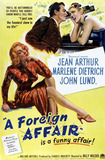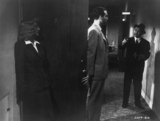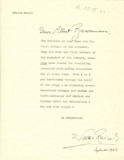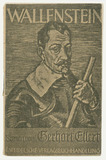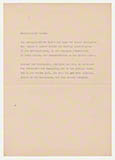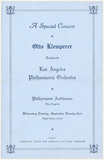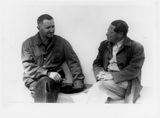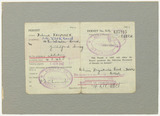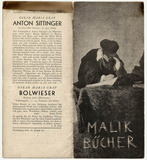Billy Wilder: A Foreign Affair (1948)
The director Billy Wilder had volunteered for the US Army in 1942, but had not been enlisted. Only after the end of the war in 1945 was he sent as a film envoy to war-ravaged Germany. With his knowledge of the local film scene, he was charged with reconstruction and denazification of the the German film industry.
Billy Wilder: Film noir Double Indemnity (1944)
This still photo from the film noir classic Double Indemnity (Ger. Frau ohne Gewissen, 1944) by Billy Wilder contains a logical error that the director had to accept due to the camera position.
Birthday letter from Walter Reisch to Albert Bassermann, September 1942
The actor Albert Bassermann had his 75th birthday on 7 September 1942 in American exile. On his birthday, he received numerous letters from his long-time friends and colleagues in Europe and new acquaintances from the Hollywood movie scene.
Bodo Uhse: Die erste Schlacht, camouflage publication (1938)
Bodo Uhse’s report about the battalion that was named after the German communist Edgar André who was executed in 1936, which fought in the Spanish Civil War in the 9th and later on in the 11th International Brigade, was released in 1938 as a book published by the Strasbourg publisher Editions Prométhée. Brought to Germany and disseminated there, this literary chronicle of the events could only be released in the form of a camouflage publication.
Bodo Uhse: Lieutenant Bertram, book cover (1944)
In 1944 the New York publishers Simon & Schuster released the American edition of Bodo Uhse's novel Leutnant Bertram under the title Lieutenant Bertram. A novel of the Nazi Luftwaffe, translated by Catherine Hutter.
Bodo Uhse: Mexikanischer Garten, manuscript
What surprised the German writers Bodo Uhse, Egon Erwin Kisch or Anna Seghers (who had emigrated to Mexico in 1940) about the country's landscape was its otherness. Everything was subject to constant change, each volcanic eruption could alter the profile again.
Booklet containing the programme of the concert to mark the foundation of the American Guild for German Cultural Freedom (23 September 1936)
In the summer of 1936, Prince Hubertus zu Loewenstein and Richard A. Bermann organised a benefit concert for the American Guild for German Cultural Freedom, which had been set up one year before.
Brecht und Feuchtwanger in front of Villa Aurora, photograph (1947)
This photograph shows the last meeting between the two writers and friends Lion Feuchtwanger and Bertolt Brecht in 1947. The picture was taken by writer and photographer Ruth Berlau, who had worked together with Brecht on several plays.
British sketching permit for Helmut Krommer (4 March 1943)
Artist or Spy?Great Britain did not present a threat to Helmut Krommer’s well-being during the Second World War. However, without the support of the British authorities, he would have been unable to pursue his work as a freelance artist.
Brochure from Malik Verlag presenting the books of Oskar Maria Graf (1937)
In 1936 and 1937 the publisher Malik Verlag published three books by Oskar Maria Graf. Graf had known the publisher Wieland Herzfelde at least since the 1920s when the memoir of his youth Frühzeit (Early Days) and the short stories Zur freundlichen Erinnerung (A Friendly Reminder) were published by his Berlin publishing house Malik Verlag.
